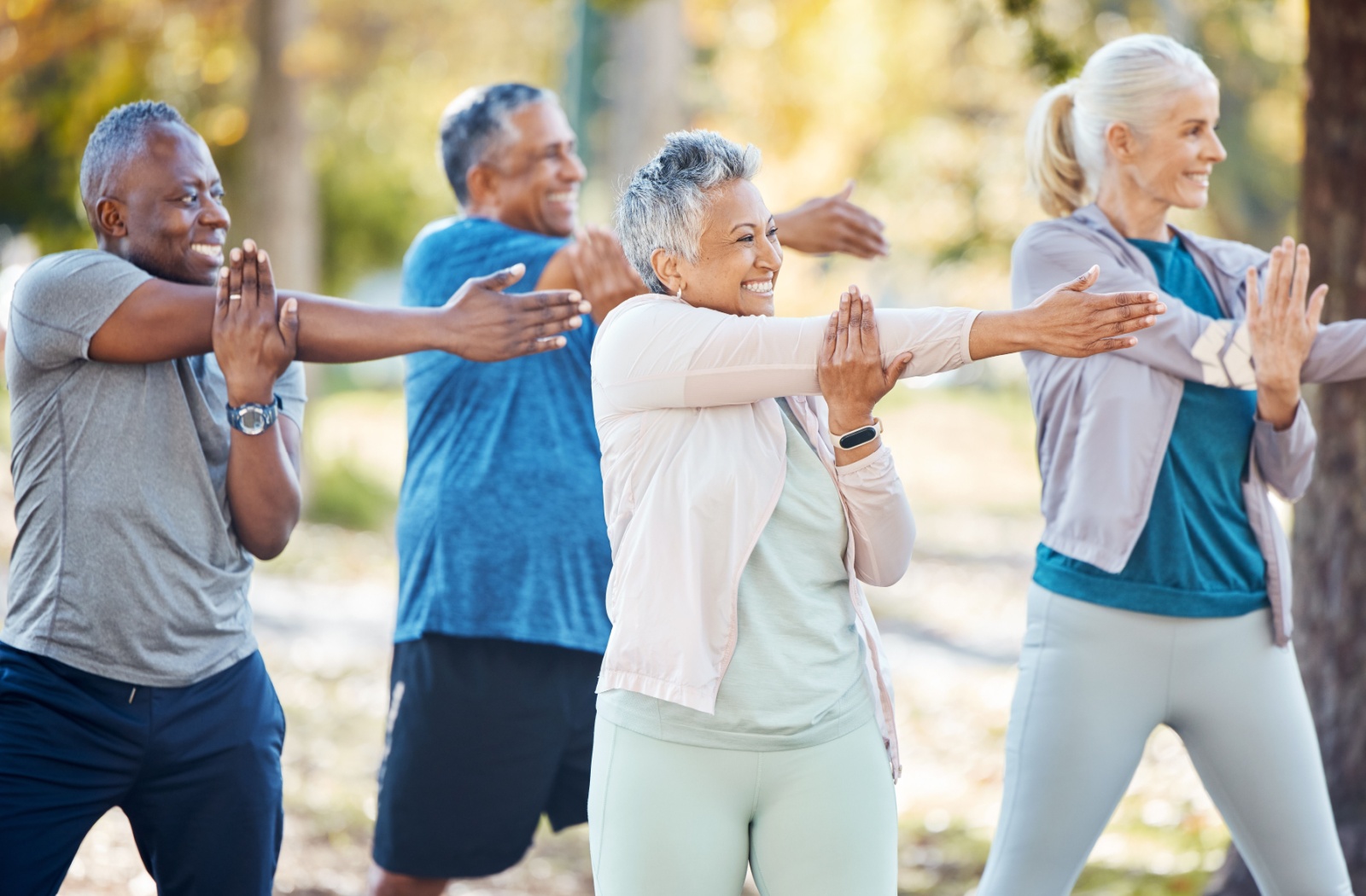Exercise Daily – Longevity is much more than a mere buzzword. It’s the pursuit of a long, healthy life—a goal many of us aspire to. But longevity isn’t just about adding years to your life; it’s about adding life to your years. In an age where chronic diseases are more prevalent than ever, it’s essential to realize that the quality of those years matters just as much as the quantity.
While genetics play a role in how long we live, lifestyle choices are far more influential in determining the quality and length of our lives. Among the most powerful tools for improving longevity is exercise. Research consistently shows that regular physical activity is one of the most effective ways to enhance both the quantity and quality of life. Through exercise, you not only reduce your risk of developing chronic illnesses but also improve your physical and mental well-being, allowing you to enjoy a longer, more fulfilling life.
How to Live Longer: Key Lifestyle Factors
When it comes to achieving longevity, several factors contribute to a healthier and longer life. While our genetic makeup does influence our lifespan to some degree, our lifestyle choices, particularly those related to physical activity, have a profound impact. Engaging in regular exercise can help prevent or manage many of the chronic conditions that contribute to early death, such as heart disease, diabetes, obesity, and even certain types of cancer.
In addition to exercise, other lifestyle factors such as a balanced diet, adequate sleep, stress management, and avoiding harmful habits like smoking and excessive alcohol consumption all play crucial roles in determining how long and how well we live.
Regular Exercise and Longevity
One of the most consistent findings in longevity research is the profound impact of exercise on lifespan. Exercise is associated with lower rates of cardiovascular disease, certain cancers, and other chronic conditions. A study published in the American Journal of Public Health found that individuals who engage in at least 150 minutes of moderate-intensity exercise per week have a 20% to 30% lower risk of dying prematurely compared to those who remain sedentary.
By engaging in regular physical activity, you can significantly improve your heart health, boost your immune system, reduce inflammation, and even improve your cognitive function as you age. Exercise doesn’t just extend life; it enhances the quality of your life as well.

The Role of Cardiovascular Health
Cardiovascular health is one of the most important factors in determining how long we live. The heart’s ability to pump blood efficiently and the condition of the blood vessels that carry oxygen and nutrients throughout the body play a direct role in overall health. When the heart and blood vessels are functioning optimally, the body can better cope with stress, resist disease, and recover from injury.
Engaging in cardiovascular exercise, such as running, swimming, or cycling, strengthens the heart and improves cardiorespiratory fitness. This, in turn, contributes to increased life expectancy by reducing the risk of heart disease, stroke, and high blood pressure, all of which are leading causes of death worldwide.
What is Cardiovascular Health?
Cardiovascular health refers to the health of the heart and blood vessels, and it encompasses the prevention and management of conditions like heart disease, hypertension, and stroke. Maintaining cardiovascular health is essential for longevity because the heart is responsible for pumping oxygen-rich blood throughout the body. Regular aerobic exercise improves heart function, lowers blood pressure, and reduces harmful cholesterol levels, all of which are important factors in preventing cardiovascular diseases.
The Study: How Much Exercise Do You Need to Live Longer?
How much exercise do you need to live longer? According to the World Health Organization (WHO), adults should aim for at least 150 minutes of moderate-intensity aerobic activity or 75 minutes of vigorous-intensity activity per week. Research supports this guideline, with studies showing that even small amounts of physical activity can have significant longevity benefits.
For example, a study published in the British Journal of Sports Medicine found that people who met these exercise recommendations had a 30% lower risk of premature death compared to those who were sedentary. Interestingly, even those who did less than the recommended amount of exercise saw some benefits, including improved cardiovascular health and reduced risk of chronic conditions.
Mortality Risk and the Power of Exercise
Exercise is not just about looking good—it’s a powerful tool for reducing mortality risk. Numerous studies confirm that people who engage in regular physical activity have a significantly lower risk of death from all causes, including heart disease, cancer, and other chronic conditions. The more active you are, the less likely you are to die prematurely, which underscores the importance of incorporating physical activity into your daily routine.
How Exercise May Lower Mortality Risk
Exercise influences several key health metrics, including blood pressure, cholesterol levels, and body composition. These factors play a direct role in reducing the risk of chronic diseases such as heart disease, diabetes, and obesity, all of which are major contributors to premature death.
Additionally, physical activity improves insulin sensitivity and reduces inflammation, which is crucial for preventing diseases like type 2 diabetes and heart disease. Regular exercise helps the body function more efficiently, improving overall health and lowering the risk of mortality.
Vigorous Exercise vs. Moderate Exercise: Which Is Better?
There has been much debate over whether vigorous exercise or moderate exercise offers better benefits for longevity. The good news is that both forms of exercise offer significant health benefits. Studies show that vigorous exercise may provide slightly greater longevity benefits compared to moderate exercise, but the most important factor is consistency.
For most people, a combination of both vigorous and moderate exercise is ideal. For example, you might engage in vigorous activity like running or cycling a few times a week, while also incorporating moderate activities like walking or swimming on the other days. This balanced approach allows you to reap the benefits of both intensity levels, improving both cardiovascular health and overall fitness.
Elite Athletes: A Case Study in Longevity
Looking at elite athletes provides valuable insights into the relationship between fitness and longevity. Studies have shown that individuals who maintain high levels of cardiorespiratory fitness, such as marathon runners, professional cyclists, and swimmers, tend to live longer than the general population.
Elite athletes typically have lower mortality rates due to their superior cardiovascular health, which is a result of their intense and consistent physical activity. However, it’s important to note that while professional athletes may experience extraordinary health benefits from their rigorous training, moderate exercise is still highly effective for the general public in promoting longevity.

Benefits of Exercise for Longevity
The benefits of exercise extend far beyond cardiovascular health. Physical activity has a broad range of positive effects on the body and mind, from boosting energy levels to improving mental well-being. Exercise helps reduce the risk of chronic diseases, enhances quality of life, and contributes to a longer life expectancy.
Cardiorespiratory Fitness and Its Impact on Health
Cardiorespiratory fitness, which refers to the ability of the heart and lungs to supply oxygen to the muscles during prolonged physical activity, is closely linked to longevity. Studies show that individuals with higher levels of cardiovascular fitness tend to live longer lives due to improved heart and lung function, better circulation, and increased endurance.
Regular aerobic exercise improves the efficiency of the heart, lungs, and circulatory system, which helps the body function optimally as you age. The better your cardiovascular fitness, the more resilient your body becomes to stress, illness, and injury, thereby increasing your chances of living a longer, healthier life.
How Exercise Affects Your Life Expectancy
Research suggests that regular physical activity can add years to your life expectancy. For instance, a study published in the Journal of Aging and Physical Activity found that people who engage in 150 minutes of moderate exercise per week can expect to live an average of 3.4 years longer than those who are sedentary. Additionally, regular exercise can help reduce the risk of developing debilitating diseases like diabetes, heart disease, and certain cancers.
The Science Behind Exercise and Longevity
The science behind exercise and longevity is both simple and profound. Regular physical activity helps maintain a healthy weight, improves circulation, strengthens muscles and bones, and enhances mental clarity. These factors collectively reduce the risk of disease and increase life expectancy, contributing to a longer, more vibrant life.
Fitness and Cardiovascular Health: The Connection
Cardiovascular health is one of the most important factors in determining how long you live. The heart’s ability to pump blood efficiently and deliver oxygen to vital organs is crucial for overall health. Exercise improves cardiovascular health by lowering blood pressure, improving blood flow, and reducing harmful cholesterol. These benefits significantly reduce the risk of heart disease, stroke, and other cardiovascular conditions.
How Cardiovascular Fitness Affects Mortality
Research shows that individuals with higher levels of cardiovascular fitness tend to have a lower risk of premature death. This is because cardiovascular exercise strengthens the heart and lungs, enabling the body to withstand physical stress and improving the body’s overall ability to function efficiently.
Physical Activity Guidelines for Longevity
According to the American Medical Association, adults should aim for at least 150 minutes of moderate physical activity or 75 minutes of vigorous exercise per week. These guidelines are designed to promote cardiovascular health and reduce the risk of chronic diseases, ultimately enhancing longevity.
What is the Ideal Amount of Exercise?
While the ideal amount of exercise depends on individual fitness levels and goals, experts generally recommend a combination of moderate and vigorous exercise each week. This approach maximizes the health benefits and contributes to a longer, healthier life.
Leisure-time Physical Activity and Its Role in Longevity
Engaging in leisure-time physical activities such as walking, gardening, or playing sports can also have a positive impact on longevity. Studies show that even light physical activity can improve health markers like blood pressure and cholesterol levels, and extend life expectancy. While more intense forms of exercise offer greater benefits, the cumulative effect of even light, regular physical activity is significant in promoting overall health and longevity.
Social Connections and Longevity
While exercise and nutrition are essential for longevity, social connections are another vital component of a long, fulfilling life. Having a strong social support system, whether through family, friends, or community involvement, contributes to mental well-being, reduces stress, and promotes a sense of purpose.
The Role of Social Interaction in Longevity
Research has shown that people with strong social networks tend to live longer, healthier lives. Positive social interactions help lower stress levels, which, in turn, reduces the risk of chronic diseases like heart disease and hypertension. Additionally, having a sense of community and belonging improves mental health, which can extend lifespan.
Social engagement also encourages physical activity. Activities such as walking with a friend, participating in group fitness classes, or joining a sports league provide both physical exercise and emotional support, creating a positive feedback loop that promotes long-term health and longevity.
Stress Management: A Key to Longevity
Chronic stress is one of the greatest threats to both physical and mental health. Long-term stress can lead to a range of health problems, including high blood pressure, heart disease, diabetes, and mental health disorders. However, exercise is one of the most effective ways to combat stress and reduce its harmful effects.
How Exercise Reduces Stress
Physical activity helps lower cortisol levels (the stress hormone) and increases the production of endorphins, which improve mood and promote relaxation. Exercise also provides an opportunity to clear the mind and reduce the mental clutter associated with stress. Whether through yoga, swimming, or a simple walk in nature, engaging in regular physical activity can significantly improve your ability to cope with stress, ultimately supporting a longer and healthier life.

Conclusion: Exercise is Key to Living a Longer Life
In conclusion, exercise is one of the most powerful tools we have for living a long, healthy, and fulfilling life. Regular physical activity improves cardiovascular health, reduces the risk of chronic diseases, enhances mental well-being, and promotes better sleep. Whether through moderate or vigorous exercise, the benefits of staying active are clear: exercise not only adds years to your life but also adds life to your years.
To maximize longevity, aim for at least 150 minutes of moderate exercise per week, along with a balanced diet, good sleep hygiene, and strong social connections. By making exercise a priority, you can enjoy a longer, healthier, and more vibrant life.
FAQs – Fitness and Longevity: Living a Long and Healthy Life
Q: How much exercise do I need to live longer?
A: Studies suggest that at least 150 minutes of moderate exercise or 75 minutes of vigorous exercise per week can significantly reduce your mortality risk and increase life expectancy.
Q: Can exercise reduce the risk of heart disease?
A: Yes, regular physical activity improves cardiovascular health, which helps reduce the risk of heart disease and stroke.
Q: Is vigorous exercise better for longevity than moderate exercise?
A: Both vigorous and moderate exercise provides longevity benefits. Vigorous exercise may offer slightly greater benefits, but moderate exercise is still highly effective.
Q: What types of exercise are best for longevity?
A: Aerobic exercises like running, swimming, and cycling are excellent for boosting cardiovascular health and increasing longevity.
Q: Can exercise help prevent chronic diseases?
A: Yes, regular exercise can help prevent chronic diseases like diabetes, obesity, and certain cancers by improving overall health and reducing risk factors.




